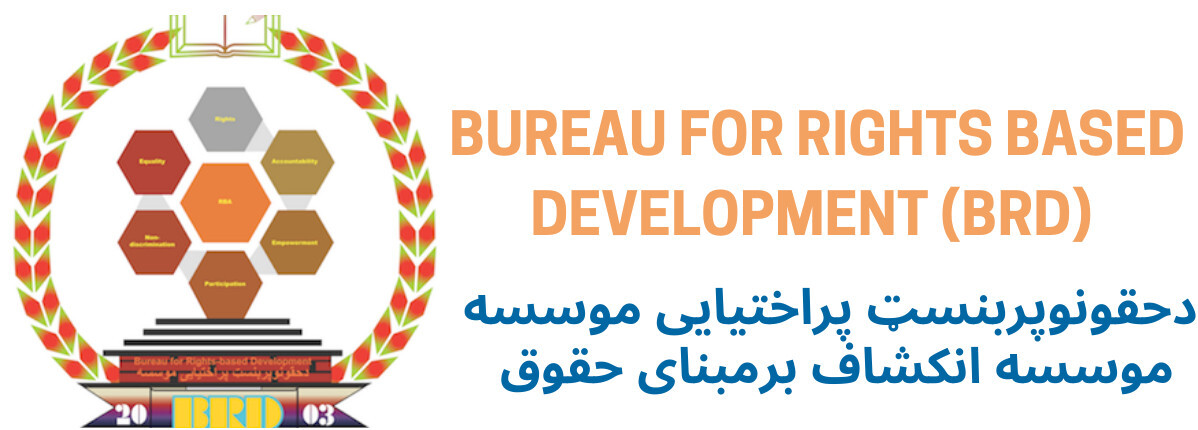Our Causes
Project Description
Help to change the course of Afghan street children’s lives by sponsoring their education. Instead of begging, scavenging through rubbish or selling plastic materials, proper education equip the children with literacy competency and technical skills required to financially support their families in a sustainable way. This project aims to enroll the street children into the formal education system but if situation doesn’t permit, vocational training will the alternative way out. Your contribution will cover the estimated cost of one-day schooling or training, and materials required for the learning of an Afghan street child.
Project Story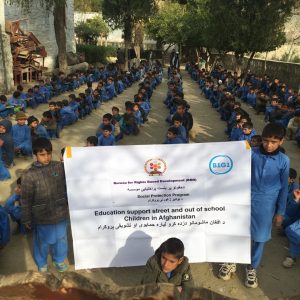 Decades of war in Afghanistan have led to a nationwide breakdown of social and economic structures. Children are among the biggest victims of the endemic poverty and vulnerability. When basic survival of a family is at risk, access to education is out of question. Everyday tens of thousands of children roam the dusty streets in Afghanistan, begging or working desperately to earn money needed for their family, worse case for the orphans. BRD Afghanistan aspires to change the future of these street children through provision of formal education or vocational training, especially the orphans. The project started in 2012, focuses on reaching out to street children in areas where BRD Afghanistan has established its presence (mainly the Eastern and Central region). Not only that it enhances resource optimisation but most importantly to ensure that 100% of the contribution reaches the beneficiaries directly. As of June 2019, this project has successfully helped 1574 children returned to school, completing the compulsory formal education. BRD Afghanistan strongly believes that education is the key to break the virtuous circle of poverty and BRD Afghanistan hopes that you will support the effort to improve the future of the thousands of families in Afghanistan.
Decades of war in Afghanistan have led to a nationwide breakdown of social and economic structures. Children are among the biggest victims of the endemic poverty and vulnerability. When basic survival of a family is at risk, access to education is out of question. Everyday tens of thousands of children roam the dusty streets in Afghanistan, begging or working desperately to earn money needed for their family, worse case for the orphans. BRD Afghanistan aspires to change the future of these street children through provision of formal education or vocational training, especially the orphans. The project started in 2012, focuses on reaching out to street children in areas where BRD Afghanistan has established its presence (mainly the Eastern and Central region). Not only that it enhances resource optimisation but most importantly to ensure that 100% of the contribution reaches the beneficiaries directly. As of June 2019, this project has successfully helped 1574 children returned to school, completing the compulsory formal education. BRD Afghanistan strongly believes that education is the key to break the virtuous circle of poverty and BRD Afghanistan hopes that you will support the effort to improve the future of the thousands of families in Afghanistan.
Donation
$2.00 – Educate a child for a day (1 – impact)
$10.00 – Educate a child for a week (5 – impacts)
$40.00 – Educate a child for a month (20 – impacts)
$240.00 – Educate a child for 6 months (120 – impacts)
$480.00 – Educate a child for a year (240 – impacts)
Participants’ Stories
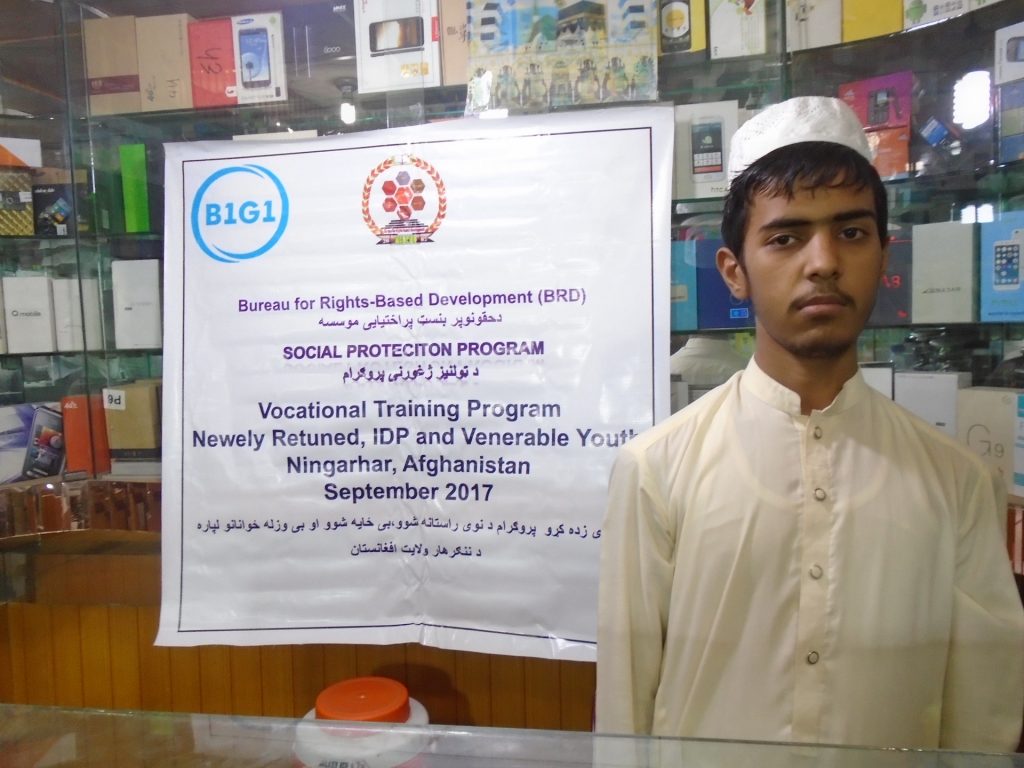 Ihasnaullah, who is 16 years old, lives with his mother, three younger sisters and three brothers. When he was 11 years old and in the fourth grade, his father, who was the only provider for the family, sadly died during the on-going military conflict. Ihasanullah’s family was struggling to survive, so as the oldest child in the family, he had to leave school and take a street job as a newspaper seller.
Ihasnaullah, who is 16 years old, lives with his mother, three younger sisters and three brothers. When he was 11 years old and in the fourth grade, his father, who was the only provider for the family, sadly died during the on-going military conflict. Ihasanullah’s family was struggling to survive, so as the oldest child in the family, he had to leave school and take a street job as a newspaper seller.
Fast forward, thanks to the Save an Afghan Street Child with Education programme, Ihsnaullah has been re-enrolled in the school and provided with a part-time training to learn the Solar Panel Repair skills. He continued his education, learnt the trade in a local welding workshop and can now support his family with additional income. He tells us ‘I was very sad and worried about our family and my siblings’ future as there was no possibility for them study. Today I am happy that I am continuing my education and also earning income to support my brothers and sisters, who can now also go school’.
Project Description
The only way to help an Afghan woman is to empower her with culturally appropriate and sustainable skills, which could eventually yield financial support for her family. Running a kitchen garden will help an Afghan woman to supply nutritious homegrown food for her family and potentially sell the excess produce in the market for some income. Your contribution will cover the cost of proper gardening training, supply of vegetable seeds and fertilizers and other required material.
Project Story
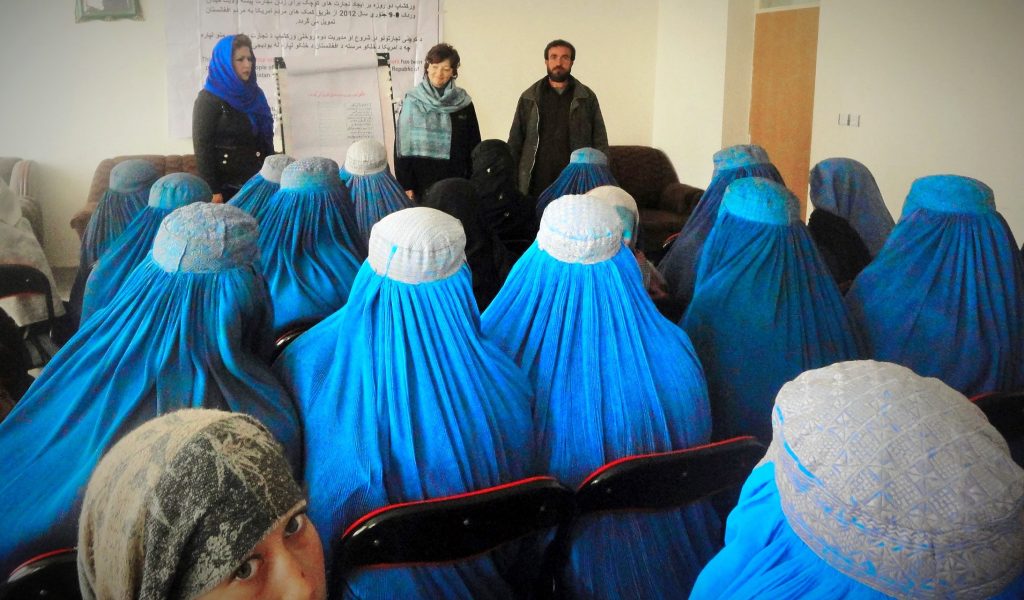 BRD Afghanistan is determined in promoting sustainable community development through pragmatic interventions. Cultural barriers and social insecurity limit the employment opportunity for Afghan women. Hence kitchen garden is a safe alternative for Afghan women to support their families. This project of BRD Afghanistan supports those women from poor families, especially the widows and breadwinners, who have access to land inside or outside of their house, to run a kitchen garden. The geographical scope of this project is the areas where BRD Afghanistan has established its presence (mainly Eastern and Central region). This helps to enhance resource optimisation and ensure 100% of fund utilisation directly for this kitchen garden project. As of November 2019, BRD Afghanistan has successfully supported 104 women in kitchen gardening and animal husbandry.
BRD Afghanistan is determined in promoting sustainable community development through pragmatic interventions. Cultural barriers and social insecurity limit the employment opportunity for Afghan women. Hence kitchen garden is a safe alternative for Afghan women to support their families. This project of BRD Afghanistan supports those women from poor families, especially the widows and breadwinners, who have access to land inside or outside of their house, to run a kitchen garden. The geographical scope of this project is the areas where BRD Afghanistan has established its presence (mainly Eastern and Central region). This helps to enhance resource optimisation and ensure 100% of fund utilisation directly for this kitchen garden project. As of November 2019, BRD Afghanistan has successfully supported 104 women in kitchen gardening and animal husbandry.
Donation
$2.20 – support kitchen garden training and material supply for a day
$15.40 – support kitchen garden training and material supply for a week
$66.00 – support kitchen garden training and material supply for a month
Participants’ Stories
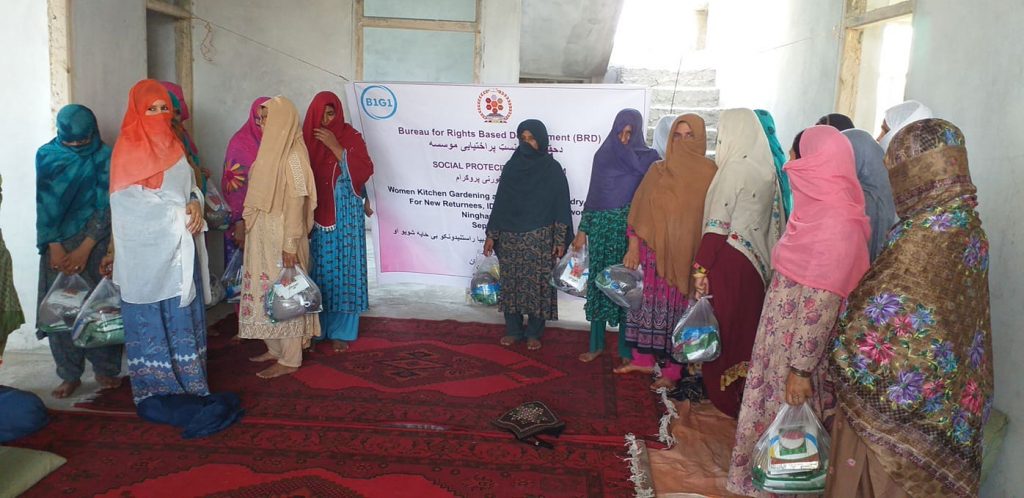 Halima Bekhtyari, who is 32 and lives in Ningarhar with her five children, has taken part in our kitchen gardening initiative which she says was a great programme, because it allowed her to learn many simple, yet useful gardening skills. The training provided Halima with knowledge about seeds, fertilizers, and how to successfully tend to her new kitchen garden. By becoming more self-sufficient, she is now able to save money and use some of those extra funds to buy in the market other products needed for her five children.
Halima Bekhtyari, who is 32 and lives in Ningarhar with her five children, has taken part in our kitchen gardening initiative which she says was a great programme, because it allowed her to learn many simple, yet useful gardening skills. The training provided Halima with knowledge about seeds, fertilizers, and how to successfully tend to her new kitchen garden. By becoming more self-sufficient, she is now able to save money and use some of those extra funds to buy in the market other products needed for her five children.
Shima from Maidan Wardak Province, a widow looking after her three sons and a daughter, works as a tailor and gets by on total monthly income of 6000AFS (approximately US$90). Shima, who has also a small farm, says ‘I am very happy that I have taken part in the programme which provided me with the support I need to set up the garden. It allows me to grow my own vegetables for the use of my family, save some money in that way and even sell some of the vegetables in the local market, bringing extra funds to my home’. The small contribution from the programme donors allowed Shima to double her income, but most importantly to become more self-sufficient and empowered to change her family’s life.
Project Description
Poverty is one of the keys causes the current armed conflict but poverty. Education and vocational training are essential to economic development that will ultimately break the cycle of poverty. Help to equip a vulnerable Afghan Women and youth with empirical skills that are in demand such as carpentry, welding, tinsmith or other culturally appropriate trade training for women ; improving his opportunities for employment or start up small-scale private enterprise. Your contribution will help to cover the cost for vocational training for one young Afghan adult over a period of 6 months.
Project Story
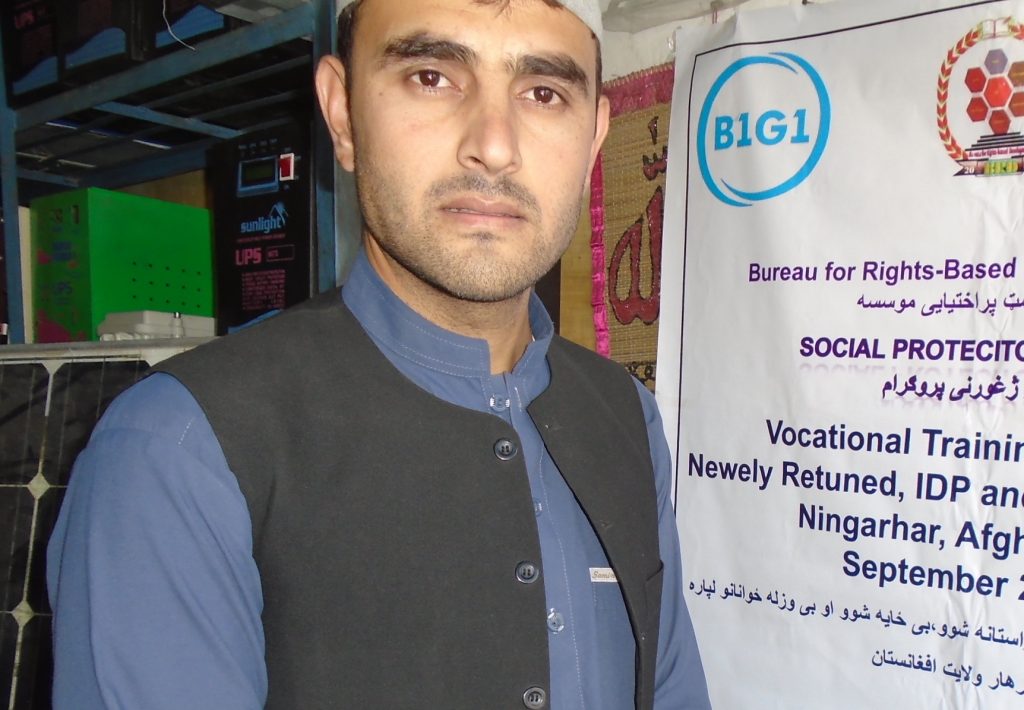 The results of war, the destruction of core institutions of state and a heavily war-torn economy led to unrivaled levels of absolute poverty, national ill health, large scale illiteracy and the almost complete disintegration of gender equity in Afghanistan. More than 9 million Afghans live in extreme poverty. The high vulnerability to natural disasters, on-going conflict and forceful repatriation of the refugees, fuel the cycle of poverty.
The results of war, the destruction of core institutions of state and a heavily war-torn economy led to unrivaled levels of absolute poverty, national ill health, large scale illiteracy and the almost complete disintegration of gender equity in Afghanistan. More than 9 million Afghans live in extreme poverty. The high vulnerability to natural disasters, on-going conflict and forceful repatriation of the refugees, fuel the cycle of poverty.
BRD Afghanistan aspires to protect the poor and vulnerable groups through continuous economic empowerment in order to reduce poverty and increase self-reliance. This project aims to provide structured vocational training to the poor women and young Afghans who struggle to financially support themselves and their families. The work skills offered in the training are carefully selected in alignment to market demand and economic development needs. Upon completion of training, the young adults should be able to find a job in the market or to start up their own small-scale business. The project focuses in provinces where BRD Afghanistan has established its presence (mainly in Central, Eastern, Central Highland and North East regions) to ensure resource optimization. As of November 2019, BRD Afghanistan has supported 105 young adults to complete the vocational training.
Donation
$6.00 – Cover the cost/day of a 6-month vocational training for 1 person
$ 12.00 – Cover the cost/day of a 6-month vocational training for 2 persons
$ 48.00 – Cover the cost/day of a 6-month vocational training for 4 persons
Participants’ Stories
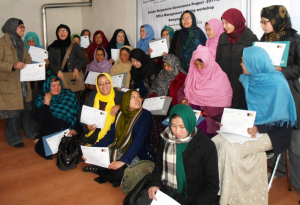 Liloma and her husband, who is a farmer, barely managed to make ends meet with joint monthly income of only 2000AFS (approx. US$40) and provide for their six sons and three daughters.However, attending the vocational training in handicrafts and tailoring has changed Liloma and her family’s life for better. She says ‘Our previous income was simply not enough for our very basic needs, but learning the handicrafts and tailoring skills through the programme means that I can now design and sew clothes to sell them in our local market. Our income has increased to 6000AFS (US$110), all thanks to the programme.’
Liloma and her husband, who is a farmer, barely managed to make ends meet with joint monthly income of only 2000AFS (approx. US$40) and provide for their six sons and three daughters.However, attending the vocational training in handicrafts and tailoring has changed Liloma and her family’s life for better. She says ‘Our previous income was simply not enough for our very basic needs, but learning the handicrafts and tailoring skills through the programme means that I can now design and sew clothes to sell them in our local market. Our income has increased to 6000AFS (US$110), all thanks to the programme.’
Project Description
Protection of human rights is one of the key elements in overall human development that will ultimately lead to the construction of a democratic pluralistic society in Afghanistan. Help to strengthen and sustain the development of human rights by supporting the human rights education led by BRD Afghanistan and Afghan Civil Society Organisation (CSO). This project aims to help individuals advocating and integrating human rights into their area of work and community living. Your contribution will cover the cost of a 3-day education session for one Afghan.
Project Story
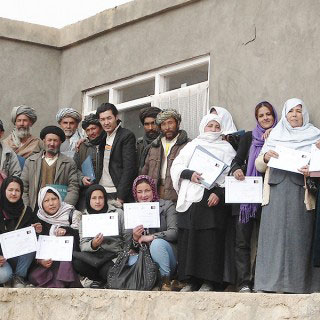 More than twenty-five years of war has devastated the Afghan society and economy. Violation and abuse of human rights are deep rooted and still remains unabated. Child labour, human trafficking, rape, extrajudicial killing, underage and forced marriage, discrimination and abuse against minorities, abuse of worker rights, arbitrary arrest and detention are common human rights problems in Afghanistan. One of the main causal factors of these violations is lack of awareness and knowledge about human rights and basic freedom among the victims.
More than twenty-five years of war has devastated the Afghan society and economy. Violation and abuse of human rights are deep rooted and still remains unabated. Child labour, human trafficking, rape, extrajudicial killing, underage and forced marriage, discrimination and abuse against minorities, abuse of worker rights, arbitrary arrest and detention are common human rights problems in Afghanistan. One of the main causal factors of these violations is lack of awareness and knowledge about human rights and basic freedom among the victims.
BRD Afghanistan is determined in fighting against violation of human rights through education and awareness. BRD Afghanistan collaborates with Afghan local Civil Society Organisation (CSO) to carry out Human Rights Education and Awareness Programme for those who are engaged in civil society activities, such as journalist, community leader and teacher. The participants are selected based on commitment level, command of basic knowledge and personal interest. The geographical scope of this project is the regions where BRD Afghanistan has established its presence in order to ensure resource optimisation. As of November, BRD Afghanistan has successfully conducted 22 education sessions in targeted provinces with an average of 25 participants in each session.
Donation
$45.00 – Support 1 person for a 3-day course
$ 90.00 – Support 2 persons for 3-day course
$ 180.00 – Support 4 persons for 3-day course
Participants’ Stories
 A young man called Farzan who at 26 is a civil society activist from Bamyan Province tells our trainers that the human rights workshops were very successful, because he and other participants understood the societal and gender issues is their community. He says with confidence that he is now more aware not only of his own rights, but also his responsibilities and the role he can play in promoting the gender equality to their community. He suggests that similar workshops should be organised more often, because of their importance for positive change in his beloved Afghanistan.
A young man called Farzan who at 26 is a civil society activist from Bamyan Province tells our trainers that the human rights workshops were very successful, because he and other participants understood the societal and gender issues is their community. He says with confidence that he is now more aware not only of his own rights, but also his responsibilities and the role he can play in promoting the gender equality to their community. He suggests that similar workshops should be organised more often, because of their importance for positive change in his beloved Afghanistan.
Mina Razai, who is 32 and works in the Department of Women Affairs in Wardak province was thrilled to be part of the human rights workshop. She says that ‘citizens, and particularly women are now aware of their rights and citizen responsibilities towards the government as well as the responsibilities of the government towards its citizens, including the importance of gender.’ Mina says: ‘I will share my new knowledge with others in my workplace and will continue to raise awareness about human rights and responsibilities’.
Project Description
Afghan Grass Roots Organization and Community Based Organization (CBO) support peacebuilding at community level, creating an environment supportive of self-sustaining and durable peace through promotion of peaceful conflict resolution and formation of an integrated civil society. Your contribution will cover the cost of a 3-day peacebuilding training course for 20 to 25 participants, aiming to deliver non-violent communication skills and pragmatic conflict resolutions to the participants who are mainly from the local CSOs and CBOs, including the community arbitrators.
Project Story
Insufficient consideration to the need for capacity development of the local communities has been a contributory factor to the failure of the aid organizations in peacebuilding in Afghanistan. It is vital to address the root or proximate causes of violence in order to stabilise society politically and socioeconomically in long run. BRD Afghanistan aims to change beliefs, attitudes and behaviours of the local community to transform the short- and long-term dynamics between individuals and groups toward a more stable, peaceful coexistence.
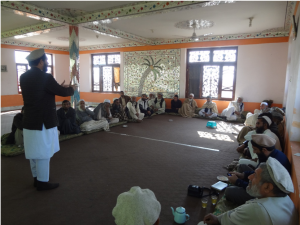 BRD Afghanistan collaborates with Grassroots organizations and Community Based Organisation (CBO) on peacebuilding efforts through educational programme on human rights and conflict management at local level and in provinces where BRD Afghanistan has established active CSO network (mainly in the Central, North East, and Eastern Region). Since 2012, BRD has successfully conducted 10 training courses in different provinces with about 20 to 25 participants in each workshop.
BRD Afghanistan collaborates with Grassroots organizations and Community Based Organisation (CBO) on peacebuilding efforts through educational programme on human rights and conflict management at local level and in provinces where BRD Afghanistan has established active CSO network (mainly in the Central, North East, and Eastern Region). Since 2012, BRD has successfully conducted 10 training courses in different provinces with about 20 to 25 participants in each workshop.
Donation
$15.00 – support one-day training cost for a person
$45.00 – support three-day (full) training cost for a person
$90.00 – support three-day (full) training cost for two persons
Participants’ Stories
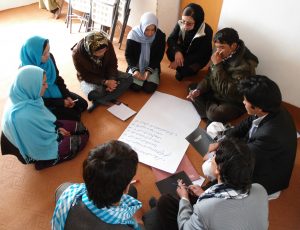 One of our female students at the faculty of Journalism, Masuda Ahmadzai, aged 22, from Eastern Region says that the 5-day training has opened her eyes to new ways of communication not only with her own family but also their neighbours and people from surrounding villages. She says that ‘because of this workshop, we now will be able to deal with problems that exist in our community and in our own families’.
One of our female students at the faculty of Journalism, Masuda Ahmadzai, aged 22, from Eastern Region says that the 5-day training has opened her eyes to new ways of communication not only with her own family but also their neighbours and people from surrounding villages. She says that ‘because of this workshop, we now will be able to deal with problems that exist in our community and in our own families’.
Another young student from Kabul Region, Mohamamd Haroon, who is 23, says that training has made a huge difference to his way of thinking about problems in his neighborhood and conflicts in his region. He says that ‘Through the role-playing during the training we were shown different techniques to deal with problems and tensions we experience every day. We have built our confidence, learnt how to find peaceful solutions, how to promote peace in our community and effectively engage in resolving conflicts. That is an important skill for us as youth; to be the force for good and peace-makers in modern Afghanistan.’
Project Description
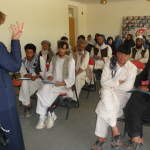 In a pastoral country like Afghanistan,[1] a significant part of the population engages in livestock production and rely on these animals not only for food but also an income and together with small-scale food crop production are the source of their subsistence. For that reason, it is of paramount importance that the people engaged in these activities not only have resources but also the skills and knowledge to maintain their livestock and improve the quality of milk products for consumption and sales.
In a pastoral country like Afghanistan,[1] a significant part of the population engages in livestock production and rely on these animals not only for food but also an income and together with small-scale food crop production are the source of their subsistence. For that reason, it is of paramount importance that the people engaged in these activities not only have resources but also the skills and knowledge to maintain their livestock and improve the quality of milk products for consumption and sales.
Unfortunately, the latest drought has caused a widespread loss of livestock and decreases in herd size and community members have been unable to replace or replenish their herds following these significant losses. Moreover, it is estimated that as a consequence of the drought a large segment of the population will become severely food insecure and there will be an increase in acute malnutrition.[2] The overall objective of this project is to improve local capacities, services and conditions for livestock rearing, fodder production, dairy processing, and dairy marketing. For that purpose, BRD has discussed livestock-related problems and consulted with community leaders and decided to select goats as the preferred animal for the project due to their hardiness and browsing habits, their ability to produce more milk than sheep, and their quick and relatively easy reproductive capacity.
The Project adopts an integrated approach and has a number of interrelated elements. A Livestock Committee is established, including representatives from different sectors of the community such as the shura, herders, and farmers groups, which will be in charge of selecting the beneficiaries of the project and monitoring implementation. The beneficiaries will receive 3 goats, supplementary fodder rations for the months when forage is limited, and technical training. The training will cover the following topics: problems in goat production, goat care (health, nutrition, feeding and watering), improved shelter, reproduction, milking and hygiene, spring fodder planting, and healthy hygienic goat milk and goat milk products. Additionally, the Project coordinates with the local system of animal health care delivery to support animal veterinary activities to reduce mortality and improve overall health of the animals.
Project Story
Afghanistan is one of the world’s largest and complex humanitarian crisis. Four decades of constant armed conflict, frequent natural disasters and ensuing mass displacements have weaken its population’s resilience.[3] Among those natural disasters, the worst drought in decades occurred in the year 2018 leaving many Afghans unable to provide enough food for their families. The drought also led to mass distress sale of livestock, high morbidity and mortality of animals and low productivity which continue to be a major concern for pastoralists, who make up 70 percent of the population.[4] According to the FAO, the drought of 2018 has caused the deteriorating food security and livelihood situation to continue, affecting more than two-thirds of the country and destroying the agriculture sector.[5]
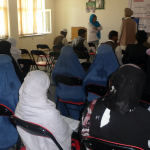 A joint report by the Government of Afghanistan and the World Bank Group found that the production of livestock, among others, has great potential to create more, sustainable, and inclusive jobs if farmers are provided with technical knowledge, financial support, and greater access to market facilities.[6]Through this project, BRD will assist individual herders and their families to replace lost livestock with goats and obtain the necessary knowledge, skills, and resources to improve the quality of goats they raise and thereby improve their families’ nutrition through increased consumption of goat milk and goat milk products as well as increase their income through sales of goat milk and goat milk products.
A joint report by the Government of Afghanistan and the World Bank Group found that the production of livestock, among others, has great potential to create more, sustainable, and inclusive jobs if farmers are provided with technical knowledge, financial support, and greater access to market facilities.[6]Through this project, BRD will assist individual herders and their families to replace lost livestock with goats and obtain the necessary knowledge, skills, and resources to improve the quality of goats they raise and thereby improve their families’ nutrition through increased consumption of goat milk and goat milk products as well as increase their income through sales of goat milk and goat milk products.
Project Description
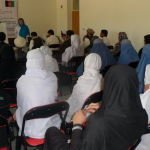 A population that is educated on its human rights together with a civil society that advocates for the applicability and protection of those rights as well as local institutions that are informed about their obligations as duty bearers are essential elements for ensuring state accountability and access to justice and public service delivery at the local level, and ultimately protecting the rights of people.
A population that is educated on its human rights together with a civil society that advocates for the applicability and protection of those rights as well as local institutions that are informed about their obligations as duty bearers are essential elements for ensuring state accountability and access to justice and public service delivery at the local level, and ultimately protecting the rights of people.
Unfortunately, Afghanistan is a country with a poor human rights record and weak rule of law, where the majority of the population lives without legal protection. Limited access to justice in Afghanistan has complex causes including the high level of illiteracy among the Afghan population, the limited knowledge that most citizens, both male and female, have of their rights and how to claim them as right holders, and the lack of awareness from the authorities about their obligations as duty bearers. To improve access to justice and public service delivery, BRD plans to raise awareness of, educate, and sensitize the population about their rights and how to assert them, improve the knowledge of local institutions about their duties, and intensify advocacy efforts.To achieve these goals BRD, will conduct 5-days training sessions for journalists, civil society, and human rights activists to enhance their skills and knowledge on effective media campaigns as well as advocacy and communication strategies to improve access to justice and accountability of public authorities.
Project Story
It is clear that the intensified conflict and volatile security situation in all the provinces and districts of Afghanistan highly affected the population access to justice and public services. However, another main barrier for accessing the justice system that people face is the lack of knowledge and information not only about their rights but also how to claim them. As a result, for many people there is no informed choice among legal systems and together with the widespread levels of legal illiteracy there is a legitimization of traditional practices that violate human rights.
Using the rights-based approach to educate, sensitize, and engage citizens as the right holders to claim their rights, inform the local institutions about their obligations as duty bearers, and harness the legal advocacy skills of local civil society, media organizations, women groups, and traditional shuras and councils is essential to promote state accountability, improve widespread access to justice, and foster the protection and promotion of the rights of people.
Donation
$ 10 USD to support 1-day training for 1 Activist
$ 50 USD to support 5-days training for 1 Activist
$ 50 USD to support 1-day training for 5 Activists
Project Description
 Coping with climate change is a key priority in overall human development that will ultimately lead to the construction of a green society in Afghanistan. You can help us strengthen and maintain the development of human rights by supporting the project led by BRD Afghanistan. This project aims to build community resilience to the climate catastrophe in the world into their area of work and community living. Contribution you make today will cover the cost of a 1-day education session for one Afghan.
Coping with climate change is a key priority in overall human development that will ultimately lead to the construction of a green society in Afghanistan. You can help us strengthen and maintain the development of human rights by supporting the project led by BRD Afghanistan. This project aims to build community resilience to the climate catastrophe in the world into their area of work and community living. Contribution you make today will cover the cost of a 1-day education session for one Afghan.
Project Story
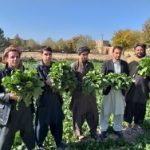 The results of 25-year Afghan war made a certain impact on the climate situation in the country. Considering that an approximate of 79% of the population is engaged in agricultural activities, the majority at a subsistence level, it is inevitable that the impacts of climate change result in devastating consequences to rural livelihoods. Communities are highly vulnerable to climate-driven disasters affecting crops and livestock while 3 quarters of the population is reliant on agriculture for their income. At around 9 million Afghans live in extreme poverty and natural disasters such as the increased frequency and severity of droughts, changes in rainfall, glacial lake outflows and increased flash flood risk only fuel the cycle of convulsion of nature, poverty and lack of greenway knowledge in the society. BRD Afghanistan aspires to protect the nature through continuous economic empowerment in order to ensure that vulnerable communities are better equipped to anticipate and respond to climate change-induced risks and cope with the resulting consequences as well as improve water use efficiency and sustainable water harvesting.
The results of 25-year Afghan war made a certain impact on the climate situation in the country. Considering that an approximate of 79% of the population is engaged in agricultural activities, the majority at a subsistence level, it is inevitable that the impacts of climate change result in devastating consequences to rural livelihoods. Communities are highly vulnerable to climate-driven disasters affecting crops and livestock while 3 quarters of the population is reliant on agriculture for their income. At around 9 million Afghans live in extreme poverty and natural disasters such as the increased frequency and severity of droughts, changes in rainfall, glacial lake outflows and increased flash flood risk only fuel the cycle of convulsion of nature, poverty and lack of greenway knowledge in the society. BRD Afghanistan aspires to protect the nature through continuous economic empowerment in order to ensure that vulnerable communities are better equipped to anticipate and respond to climate change-induced risks and cope with the resulting consequences as well as improve water use efficiency and sustainable water harvesting.
Donation
$2.00 – educate one person with some eco-techniques for a day (1 – impact) $10.00 – educate a person with green way of life for a week (5 – impacts)
$38.00 – help to organize series of climate change lessons at school for a month (20 – impacts)
$235.00 – provide trainings in water management techniques for 6 months (120 – impacts)
$ 300 — can impact 100 particpants in coping with climate change problem
Participant’s Stories
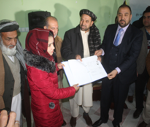 Fatima, from the Derazi village, serves as duty chairwomen of the Sraji Irrigation Association. Fatima says that there were problems in managing the irrigation system, water distribution, and other repair works, as every farmer was on his own. Moreover, there was hardly a role for women to be engaged in the management of the irrigation system. BRD supported them in establishing the association, training and designing a project to improve their irrigation system. She says that their association is now functioning and all the members are taking decisions and working together all thanks to this project. Additionally, the training benefited them in all aspects of the irrigation management, provided them with the skills to improve water management in their villages, and they also received support from BRD on how to implement an irrigation structure repair project.
Fatima, from the Derazi village, serves as duty chairwomen of the Sraji Irrigation Association. Fatima says that there were problems in managing the irrigation system, water distribution, and other repair works, as every farmer was on his own. Moreover, there was hardly a role for women to be engaged in the management of the irrigation system. BRD supported them in establishing the association, training and designing a project to improve their irrigation system. She says that their association is now functioning and all the members are taking decisions and working together all thanks to this project. Additionally, the training benefited them in all aspects of the irrigation management, provided them with the skills to improve water management in their villages, and they also received support from BRD on how to implement an irrigation structure repair project.
Project Description
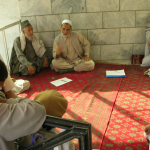 Protection of the return of refugees to their home country is one of the key elements in overall human development given the adequate conditions since returnees generally share the same culture as the local population, facilitating assimilation in Afghanistan. In addition, increased spending, both by the private and public sectors, as well as increased output if the incoming refugees are able to find jobs, can contribute positively to economic growth. Unfortunately, the high numbers of refugees that have returned to Afghanistan in the last few years has put a lot of pressure on the government’s capacity to absorb refugees in an already difficult environment of high unemployment and internally displaced people after decades of conflict.2 Given the difficult economic climate, prospects for returnees are generally poor since they tend experience a deterioration in the employment opportunities, wages, and job stability after returning to Afghanistan. Help to strengthen and sustain the return of refugees by supporting the sustainable reintegration led by BRD Afghanistan. These consist of vocational skills training and follow up support to create immediate positive economic impacts both on the returnees and the wider community. Upon completion, participants are provided with post graduation support, including toolkits and additional basic technical business or marketing training for those opting to commence operation on their own or start a small business. BRD provides one livelihood package per returnees’ family. Your contribution will cover the cost of a livelihood package per family (including training and follow up support).
Protection of the return of refugees to their home country is one of the key elements in overall human development given the adequate conditions since returnees generally share the same culture as the local population, facilitating assimilation in Afghanistan. In addition, increased spending, both by the private and public sectors, as well as increased output if the incoming refugees are able to find jobs, can contribute positively to economic growth. Unfortunately, the high numbers of refugees that have returned to Afghanistan in the last few years has put a lot of pressure on the government’s capacity to absorb refugees in an already difficult environment of high unemployment and internally displaced people after decades of conflict.2 Given the difficult economic climate, prospects for returnees are generally poor since they tend experience a deterioration in the employment opportunities, wages, and job stability after returning to Afghanistan. Help to strengthen and sustain the return of refugees by supporting the sustainable reintegration led by BRD Afghanistan. These consist of vocational skills training and follow up support to create immediate positive economic impacts both on the returnees and the wider community. Upon completion, participants are provided with post graduation support, including toolkits and additional basic technical business or marketing training for those opting to commence operation on their own or start a small business. BRD provides one livelihood package per returnees’ family. Your contribution will cover the cost of a livelihood package per family (including training and follow up support).
Project Story
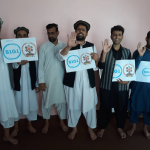 Considering that despite the ongoing conflict, roughly 2.4 million displaced Afghans have returned to Afghanistan since 2014. Refugee returns have strained public services in Afghanistan and intensified competition for scarce economic opportunities, affecting not only displaced people, but all Afghans. Moreover, the UNHCR has voiced its concern that the pace of returns far outstripped Afghanistan’s capacity to help people reintegrate after years – in most cases, unfortunately, decades – of refuge in Pakistan. Typical returning refugees have a high risk of falling into poverty as they are typically laborers and workers in the informal economy with limited savings, daily wage laborers in non-agricultural sectors, or small business owners who are forced to liquidate their assets. With large family sizes, and low reported incomes, it is likely that many returnees are living close to or below the poverty line.BRD Afghanistan is determined to ensure returnees and communities in areas of high return in Afghanistan share an enabling environment for sustainable reintegration in which returnees reach a level of economic self-sufficiency, social stability within their community, and psychosocial well-being that enable them to cope with (re-) migration drivers.
Considering that despite the ongoing conflict, roughly 2.4 million displaced Afghans have returned to Afghanistan since 2014. Refugee returns have strained public services in Afghanistan and intensified competition for scarce economic opportunities, affecting not only displaced people, but all Afghans. Moreover, the UNHCR has voiced its concern that the pace of returns far outstripped Afghanistan’s capacity to help people reintegrate after years – in most cases, unfortunately, decades – of refuge in Pakistan. Typical returning refugees have a high risk of falling into poverty as they are typically laborers and workers in the informal economy with limited savings, daily wage laborers in non-agricultural sectors, or small business owners who are forced to liquidate their assets. With large family sizes, and low reported incomes, it is likely that many returnees are living close to or below the poverty line.BRD Afghanistan is determined to ensure returnees and communities in areas of high return in Afghanistan share an enabling environment for sustainable reintegration in which returnees reach a level of economic self-sufficiency, social stability within their community, and psychosocial well-being that enable them to cope with (re-) migration drivers.
Donation
$38.00 – livelihood package per person
$76.00 – livelihood package per two adults
$150 — livelihood package per family (including training and follow up support)
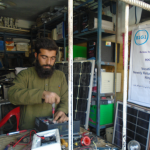 Participant’s Stories
Participant’s Stories
Young 21 years old Ezatullah has recently returned from Pakistan together with his family to Nangarhar province. Though he had been studying while they were refugees in Pakistan, when his family returned, the lack of sufficient income forced him to look for labor work instead of resuming his studies. However, the large number of returnees and displaced families made it difficult to find labor in the city of Jalalabad. He is enrolled in BRD vocational training program which provided him with the skills to learn how to repair solar panels. He is happy for learning a skill and he also received support from BRD on how to establish his own repair shop to earn an income to support his family and will allow him to resume his studies.
Project Description
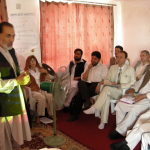 The protection and promotion of human rights amongst all members of society, specially for women and children, is an important and crucial step towards achieving a society that is more democratic and empowers its citizens economically, socially, politically, and culturally.According to UN Women, women and girls in Afghanistan face persistent discrimination, violence, street harassment, forced and child marriage, severe restrictions on working and studying outside the home, and limited access to justice.[1] For that reason, BRD wants to raise legal awareness of women and children about their human rights (such as the right to defense counsel) and strengthen their capacity to claim their rights by utilizing the existing justice delivery systems but also to enhance the capacity of justice delivery system actors to perform and deliver in compliance with the rule of law and human rights standards.To achieve those goals BRD will organize special events to raise awareness of community leaders eachers, and other community based organizations that will include face to face meetings regarding women and children’s rights, formal justice system and the roles and responsibilities of all involved actors. Additionally, BRD will raise awareness of the community in the targeted districts and provinces by designing and printing informative material such as posters, flyers, and leaflets to be distributed in public places. The printed material will contain the key message to be convened to the communities regarding women and children’s human rights and how to access the justice system and obtain necessary protection.
The protection and promotion of human rights amongst all members of society, specially for women and children, is an important and crucial step towards achieving a society that is more democratic and empowers its citizens economically, socially, politically, and culturally.According to UN Women, women and girls in Afghanistan face persistent discrimination, violence, street harassment, forced and child marriage, severe restrictions on working and studying outside the home, and limited access to justice.[1] For that reason, BRD wants to raise legal awareness of women and children about their human rights (such as the right to defense counsel) and strengthen their capacity to claim their rights by utilizing the existing justice delivery systems but also to enhance the capacity of justice delivery system actors to perform and deliver in compliance with the rule of law and human rights standards.To achieve those goals BRD will organize special events to raise awareness of community leaders eachers, and other community based organizations that will include face to face meetings regarding women and children’s rights, formal justice system and the roles and responsibilities of all involved actors. Additionally, BRD will raise awareness of the community in the targeted districts and provinces by designing and printing informative material such as posters, flyers, and leaflets to be distributed in public places. The printed material will contain the key message to be convened to the communities regarding women and children’s human rights and how to access the justice system and obtain necessary protection.
Project Story
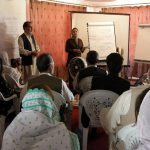 During the two decades of war and internal conflict, human rights violations were arbitrarily committed. These abuses have continued unabated due to the lack of awareness about human rights in the general public and also on the part of public officials and non-governmental organizations. The Elimination of Violence against Women law, passed by Presidential Decree in 2009, can contribute to improving women’s access to justice if it is effectively implemented. However, traditional forms of dispute settlement currently play an important role in the overall administration of justice, including enforcement. As confirmed by statistics, in rural areas formal justice is ancillary to traditional mechanisms and rules which indeed administer both criminal and civil cases and it is possible to estimate that traditional mechanisms will remain prevalent for years to come. According to UN Women, traditional justice systems in Afghanistan continue to work against women’s rights, undermining formal legal reform, and women who seek help to escape violence often face indifference or criminal sanctions for committing moral crimes.In order to ensure both women and children have access to formal justice at the district level it is paramount that all actors involved are aware of women and children’s constitutional rights, principles of equality, non-discrimination, and procedural fairness, rights to defense counsel and its role in each stage of criminal proceedings, role of police in assisting persons in custody to have access to a defense counsel, and powers of arrest and detention, among other things.The awareness events that BRD organizes will ensure that the actors involved in justice procedures (both members of the community and justice officials alike) have the necessary knowledge to ensure women and children can access the justice system, avail themselves of their human rights, and receive necessary protection.
During the two decades of war and internal conflict, human rights violations were arbitrarily committed. These abuses have continued unabated due to the lack of awareness about human rights in the general public and also on the part of public officials and non-governmental organizations. The Elimination of Violence against Women law, passed by Presidential Decree in 2009, can contribute to improving women’s access to justice if it is effectively implemented. However, traditional forms of dispute settlement currently play an important role in the overall administration of justice, including enforcement. As confirmed by statistics, in rural areas formal justice is ancillary to traditional mechanisms and rules which indeed administer both criminal and civil cases and it is possible to estimate that traditional mechanisms will remain prevalent for years to come. According to UN Women, traditional justice systems in Afghanistan continue to work against women’s rights, undermining formal legal reform, and women who seek help to escape violence often face indifference or criminal sanctions for committing moral crimes.In order to ensure both women and children have access to formal justice at the district level it is paramount that all actors involved are aware of women and children’s constitutional rights, principles of equality, non-discrimination, and procedural fairness, rights to defense counsel and its role in each stage of criminal proceedings, role of police in assisting persons in custody to have access to a defense counsel, and powers of arrest and detention, among other things.The awareness events that BRD organizes will ensure that the actors involved in justice procedures (both members of the community and justice officials alike) have the necessary knowledge to ensure women and children can access the justice system, avail themselves of their human rights, and receive necessary protection.
Donation
$4 USD – Support 1 participant
$40 USD – Support 10 participants
$100 USD – Support a full event for 25 participants
Participant’s stories:
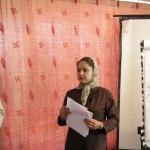 Young woman Shaifiqa Azizi, who at 26 is a civil society activist from Kabul Province, says that the human rights workshops were very successful because she and other participants understood the societal and gender issues in their community. She says with confidence that she is now more aware not only of her own rights, but also her responsibilities and the role she can play in promoting human rights and gender equality. She suggests that similar workshops should be organized more often because of their importance for positive change in her beloved Afghanistan.
Young woman Shaifiqa Azizi, who at 26 is a civil society activist from Kabul Province, says that the human rights workshops were very successful because she and other participants understood the societal and gender issues in their community. She says with confidence that she is now more aware not only of her own rights, but also her responsibilities and the role she can play in promoting human rights and gender equality. She suggests that similar workshops should be organized more often because of their importance for positive change in her beloved Afghanistan.
Project Description
 Correct waste management is important for human health and well-being and environmental preservation since improper handling and disposal of waste can pollute drinking water and emit toxins into the air. Moreover, it also has positive implications for sustainability and economical growth as there are many secondary raw materials and resources present in waste streams such as metals, wood, glass, paper, and plastics.However, much of the discussion regarding the environment in Afghanistan has focused on illicit natural resource extraction and less attention has been paid to the health and environmental risks from pollution, yet new estimates indicate that it is killing thousands each year. For example, water pollution and limited access to clean water sources is thought to be a causal factor in high levels of child mortality in Afghanistan.[1] Due to low public awareness and high levels of illiteracy, BRD finds it important to put in place a project to educate and raise awareness of the targeted population on the risks and consequences of incorrect waste disposal and their responsibility for waste management by organizing awareness raising and clean-up campaigns.
Correct waste management is important for human health and well-being and environmental preservation since improper handling and disposal of waste can pollute drinking water and emit toxins into the air. Moreover, it also has positive implications for sustainability and economical growth as there are many secondary raw materials and resources present in waste streams such as metals, wood, glass, paper, and plastics.However, much of the discussion regarding the environment in Afghanistan has focused on illicit natural resource extraction and less attention has been paid to the health and environmental risks from pollution, yet new estimates indicate that it is killing thousands each year. For example, water pollution and limited access to clean water sources is thought to be a causal factor in high levels of child mortality in Afghanistan.[1] Due to low public awareness and high levels of illiteracy, BRD finds it important to put in place a project to educate and raise awareness of the targeted population on the risks and consequences of incorrect waste disposal and their responsibility for waste management by organizing awareness raising and clean-up campaigns.
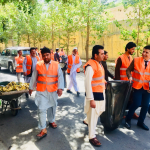 The main objective of the action is to raise awareness, educate, and change the attitudes of of Afghan youth to lead, coordinate, and engage in the action against waste in their respective districts. For that purpose, BRD will mobilize and select the members of 25 youth coordination teams in 5 selected districts with high trash production; organize a 3-days partnership building seminar for 25 youth coordinators to improve their knowledge and equip them with key skills on mobilization, communication, and coordination to develop follow up plans and activities for the teams in their respective districts for organizing a clean-up action and disseminating information; and assist the youth coordination teams to educate, mobilize, and recruit other youth volunteers and community members for the clean-up action in their districts and to be engaged continuously after the action.
The main objective of the action is to raise awareness, educate, and change the attitudes of of Afghan youth to lead, coordinate, and engage in the action against waste in their respective districts. For that purpose, BRD will mobilize and select the members of 25 youth coordination teams in 5 selected districts with high trash production; organize a 3-days partnership building seminar for 25 youth coordinators to improve their knowledge and equip them with key skills on mobilization, communication, and coordination to develop follow up plans and activities for the teams in their respective districts for organizing a clean-up action and disseminating information; and assist the youth coordination teams to educate, mobilize, and recruit other youth volunteers and community members for the clean-up action in their districts and to be engaged continuously after the action.
Project Story
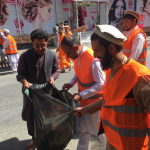 Municipal waste management is underdeveloped in Afghanistan cities and highly dependent on informal and unsanitary dumping. This has resulted in large amounts of solid waste accumulated on roadsides, back yards, drains, rivers, and open places representing a significant environmental hazard contributing to urban flooding and water contamination. As a result, areas with high levels of waste see increased rates of diarrhea and respiratory infections.[2] This problem is especially acute in major cities like Kabul, which has experienced rapid urban growth due to a large number of returnees and new urban dwellers and the increase in waste from growing economic activity.[3] The main causes are the absence of an effective strategy to deal with the problem, the municipality’s lack of capacity to respond, and the lack of knowledge from the population on the consequences of incorrect waste disposal and management. The lack of awareness on solid waste recycling could be attributed to the inability of municipalities to educate the population and carry out adequate public awareness campaigns. Unfortunately, that could result in serious adverse effects on solid waste management systems and activities as incorrect knowledge and little participation of the people could render the underlying objectives of these activities unachievable.[4] BRD intends to conduct a 3-days seminar to raise awareness and educate the Afghan youth on the key environmental problems and hazards of different types of waste and trash and the consequences to health and nature from incorrect disposal and management. Additionally, the project will focus on clarifying their roles and responsibilities in promoting a clean environment. The awareness and education seminar will provide Afghan youth with the appropriate knowledge, skills, and ethical commitments to engage critically in decision-making and act on current and emerging environmental and development problems.
Municipal waste management is underdeveloped in Afghanistan cities and highly dependent on informal and unsanitary dumping. This has resulted in large amounts of solid waste accumulated on roadsides, back yards, drains, rivers, and open places representing a significant environmental hazard contributing to urban flooding and water contamination. As a result, areas with high levels of waste see increased rates of diarrhea and respiratory infections.[2] This problem is especially acute in major cities like Kabul, which has experienced rapid urban growth due to a large number of returnees and new urban dwellers and the increase in waste from growing economic activity.[3] The main causes are the absence of an effective strategy to deal with the problem, the municipality’s lack of capacity to respond, and the lack of knowledge from the population on the consequences of incorrect waste disposal and management. The lack of awareness on solid waste recycling could be attributed to the inability of municipalities to educate the population and carry out adequate public awareness campaigns. Unfortunately, that could result in serious adverse effects on solid waste management systems and activities as incorrect knowledge and little participation of the people could render the underlying objectives of these activities unachievable.[4] BRD intends to conduct a 3-days seminar to raise awareness and educate the Afghan youth on the key environmental problems and hazards of different types of waste and trash and the consequences to health and nature from incorrect disposal and management. Additionally, the project will focus on clarifying their roles and responsibilities in promoting a clean environment. The awareness and education seminar will provide Afghan youth with the appropriate knowledge, skills, and ethical commitments to engage critically in decision-making and act on current and emerging environmental and development problems.
Donations
$ 10 USD to support 1-day training for 1 youth Activist
$ 30 USD to support 3-days training for 1 youth Activist
$ 50 USD to support 1-day training for 5 youth Activists
